
"Me and Bobby McGee" is a song written by American singer-songwriter Kris Kristofferson and originally performed by Roger Miller. Fred Foster shares the writing credit, as Kristofferson wrote the song based on a suggestion from Foster. A posthumously released version by Janis Joplin topped the U.S. singles chart in 1971, making the song the second posthumously released No. 1 single in U.S. chart history after "(Sittin' On) The Dock of the Bay" by Otis Redding. Gordon Lightfoot released a version that reached number 1 on the Canadian country charts in 1970. Jerry Lee Lewis released a version that was number 1 on the country charts in December 1971/January 1972 as the "B" side of "Would You Take Another Chance on Me". Billboard ranked Joplin's version as the No. 11 song for 1971.

"Promised Land" is a song lyric written by Chuck Berry to the melody of "Wabash Cannonball", an American folk song. The song was first recorded in this version by Berry in 1964 for his album St. Louis to Liverpool. Released in December 1964, it was Berry's fourth single issued following his prison term for a Mann Act conviction. The record peaked at #41 in the Billboard charts on January 16, 1965.

"Honky Cat" is a song written by English musician Elton John and songwriter Bernie Taupin, and performed by John. It was used as the opening track for John's fifth studio album, Honky Château, released in 1972.
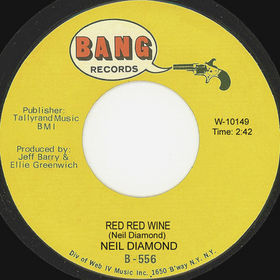
"Red Red Wine" is a song originally written, performed and recorded by American singer Neil Diamond in 1967 that appears on his second studio album, Just for You. The lyrics are written from the perspective of a person who finds that drinking red wine is the only way to forget his woes.

"Just the Way You Are" is a song by Billy Joel from his fifth studio album The Stranger (1977), released as the album's second single in early November 1977. It became both Joel's first US Top 10 and UK Top 20 single, as well as Joel's first Gold single in the US. The song also topped the Billboard Easy Listening Chart for the entire month of January 1978.
"Needles and Pins" is a rock song credited to American writers Jack Nitzsche and Sonny Bono. Jackie DeShannon recorded it in 1963 and other versions followed. The most successful ones were by the Searchers, whose version reached No. 1 on the UK singles chart in 1964, and Smokie, who had a worldwide hit in 1977. Others who recorded the song include the Ramones, Gene Clark, Petula Clark, and Tom Petty and the Heartbreakers with Stevie Nicks.
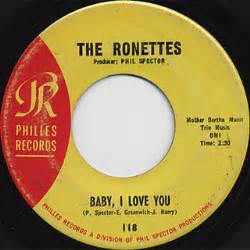
"Baby, I Love You" is a song originally recorded by the Ronettes in 1963 and released on their debut album Presenting the Fabulous Ronettes (1964). The song was written by Jeff Barry, Ellie Greenwich, and Phil Spector, and produced by Spector.

"Sheena Is a Punk Rocker" is a song by American punk rock band Ramones, released in 1977 through Sire Records. Written by front man and lead vocalist Joey Ramone it appears on the band's third studio album Rocket to Russia (1977). The song is well known for its early 1960s influence of surf rock and bubblegum pop that influenced Joey; it has since remained one of the band's most popular songs.
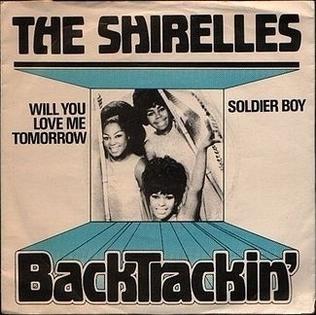
"Will You Love Me Tomorrow", sometimes known as "Will You Still Love Me Tomorrow", is a song with words by Gerry Goffin and music composed by Carole King. It was recorded in 1960 by the Shirelles at Bell Sound Studios in New York City, and hit number one on the Billboard Hot 100 chart. The song was the first by an African-American all-girl group to reach number one in the United States. It has since been recorded by many other artists, including a version by co-writer King released on her 1971 album Tapestry.
"Fire" is a song written by Bruce Springsteen in 1977 which had its highest profile as a 1978 single release by the Pointer Sisters. The song was later released by Robert Gordon and Springsteen himself.
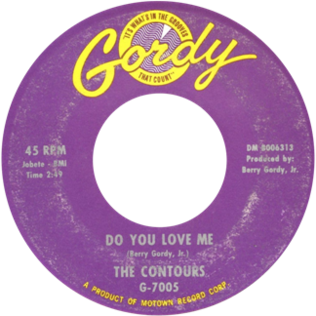
"Do You Love Me" is a rhythm and blues song recorded by the Contours in 1962. Written and produced by Motown Records owner Berry Gordy Jr., it appeared twice on the Billboard Hot 100 chart, reaching numbers three in 1962 and eleven in 1988.
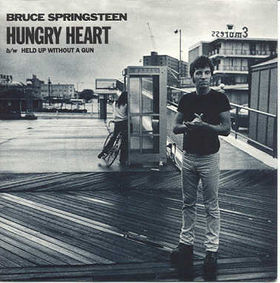
"Hungry Heart" is a rock song written and performed by Bruce Springsteen on his fifth album, The River. It was released as the album's lead single in 1980 and became Springsteen's first big hit on the Billboard Hot 100 chart peaking at number five.
"I Don't Want to Talk About It" is a song written by American guitarist Danny Whitten. It was first recorded by American rock band Crazy Horse and issued as the final track on side one of their 1971 eponymous album. It was Whitten's signature tune, but gained more fame via its numerous cover versions, especially that by Rod Stewart. Cash Box magazine has described it as "a magnificent ballad outing."

"Last Child" is a song by American rock band Aerosmith. It was written by Steven Tyler and Brad Whitford and released as the first single from the album Rocks in 1976. It peaked at number 21 on the Billboard Hot 100, one of a string of hits for the band in the mid-1970s.

"Maniac" is a song from the 1983 film Flashdance that was written by Dennis Matkosky and its performer, Michael Sembello. The original idea for the song came to Matkosky while watching a news report on a serial killer, which inspired gruesome lyrics that he and Sembello expanded upon after finding a 1980 horror film with the same name. When Flashdance director Adrian Lyne grew attached to the demo of the song used during filming, his music supervisor Phil Ramone requested lyrics more appropriate for their story of a dancer and worked with Sembello to produce a new version for the soundtrack. The new recording was used for a scene in which protagonist Alexandra Owens trains rigorously at home.

"Honesty" is a song by American singer-songwriter Billy Joel, released by Columbia Records as the third US single from his sixth studio album 52nd Street (1978) in 1979. "Honesty" was solely written by Joel, while production was handled by Phil Ramone. The song appears on the Dutch and Japanese editions of Greatest Hits Volume 2, replacing "Don't Ask Me Why" (1980).

"You May Be Right" is a song written and performed by rock singer Billy Joel, released as a single and the opening track from his 1980 album Glass Houses. The single reached No. 7 on the US charts and No. 6 in Canada. It failed to chart, however, in the UK unlike his preceding and succeeding singles "All for Leyna" and "It's Still Rock and Roll to Me". The Japanese single features "Close to the Borderline" as a B-side.
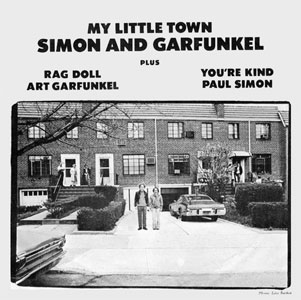
"My Little Town" is a 1975 song by the American duo Simon & Garfunkel. It was written by Paul Simon, who produced the track along with Art Garfunkel and Phil Ramone. The song was included on the 1975 solo releases from both Simon and Garfunkel (Breakaway). It would not appear on any of the duo's albums until the 1997 anthology box set Old Friends and the 1999 compilation album The Best of Simon and Garfunkel. It was the first single release credited to the duo since the 1972 release of "America", released in conjunction with Simon and Garfunkel's Greatest Hits.
"Funny How Time Slips Away" is a song written by Willie Nelson and first recorded by country singer Billy Walker. Walker's version was issued as a single by Columbia Records in June 1961 and peaked at number 23 on the Hot C&W Sides chart. The song has been featured in several live action films and television shows, such as in the first episode of the second season of AMC’s Better Call Saul and in the 2020 Netflix drama The Devil All the Time.
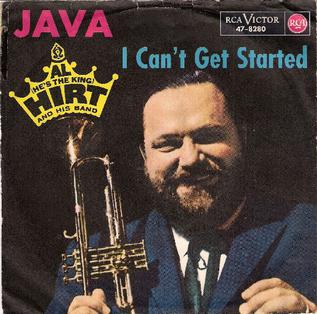
"Java" is an instrumental adaptation from a 1958 LP of piano compositions, The Wild Sounds of New Orleans, by Tousan, also known as New Orleans producer/songwriter Allen Toussaint. As was the case of the rest of Toussaint's LP, "Java" was composed in studio, primarily by Toussaint.















